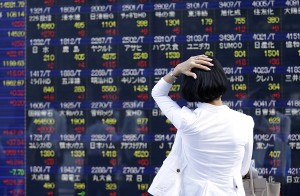Emerging markets lead Asia rally after Fed decision

A woman watches the electronic stock board of a securities firm in Tokyo, Thursday, Sept. 19, 2013. The Nikkei 225 closed up 260.82 points, or 1.80 percent, at 14,766.18 Thursday as Asian stock markets surged after the US Federal Reserve unexpectedly refrained from reducing its massive economic stimulus. AP PHOTO/SHIZUO KAMBAYASHI
HONG KONG—Stocks and currencies in emerging markets led an Asian rally Thursday following a surprise decision by the US Federal Reserve to keep its massive stimulus program intact.
The announcement to hold off winding down its $85 billion a month bond-buying fueled a buying spree on Wall Street, sending the Dow and S&P 500 to record highs.
And Asia took up the baton Thursday, with under-pressure developing economies breathing a sigh of relief after suffering a heavy sell-off in August as investors bet on the Fed tightening its monetary policy.
Jakarta surged 4.65 percent, or 207.48 points, at 4,670.73, Mumbai jumped 3.43 percent, or 684.48 points, to 20,646.64, Manila soared 2.81 percent, or 177.74 points, to 6,511.70 and Bangkok climbed 3.47 percent, or 49.93 points, to 1,489.06.
In Tokyo the Nikkei rose 1.80 percent, or 260.82 points, to 14,766.18 and Hong Kong added 1.67 percent, or 385.06 points, to 23,502.51. Sydney rallied 1.10 percent, or 57.4 points, to finish at a new five-year high of 5,295.5, and Wellington added 1.05 percent, or 49.21 points, to end at 4,753.03.
Article continues after this advertisementSeoul, Shanghai and Taipei were closed for public holidays.
Article continues after this advertisementIn an eagerly awaited announcement, the Fed said it would keep the stimulus in place as it wanted to further gauge the economic impact of public spending cuts and a spike in interest rates in the past four months.
Instead it cut its growth forecast for this year and next as chairman Ben Bernanke warned of possibly “very serious consequences” from a brewing political battle in Washington over a new budget and the US debt ceiling.
“The Federal Reserve’s policy is to do whatever we can to keep the economy on course. And so if these actions led the economy to slow, then we would have to take that into account, surely,” he told reporters.
He said the bank could still start reducing the bond-buying—which aims to hold down long-term interest rates—in the next three months, but only if the economic outlook improves.
“There is no fixed calendar,” he said.
Wall Street welcomed the announcement. The Dow rose 0.95 percent, the S&P 500 climbed 1.22 percent and the Nasdaq was up 1.01 percent.
Will foreign investors return?
Most economists had expected the Fed to begin tapering its spending—with forecasts of a reduction of $5 billion-$15 billion—after weeks of upbeat data suggested the US economy was at last gaining strength.
But Matthew Sherwood, head of investment market research at Perpetual in Sydney, said: “It is a pretty patchy recovery, and it is a sign that the US is not ready for a reduced stimulus.”
With the prospect of vast sums of cash continuing to be pumped into financial markets, the US dollar sank in New York to 98.13 yen from 99.20 yen in Tokyo earlier in the day, while the euro jumped to $1.3511 from $1.3353.
On Thursday the US unit bounced back against the yen, buying 98.81 yen, but the euro rose to $1.3530. The European single currency also fetched 133.68 yen against 132.55 yen.
The main beneficiaries of the news, however, were emerging economies, which have suffered a torrid few months on expectations the Fed with begin cutting down its bond-buying.
India’s rupee was at 61.83 to the dollar, well up from the record levels above 69.00 seen at the start of September, while the greenback also fetched 30.92 Thai baht, compared with 32.45 baht a few weeks ago.
The dollar fell to 1,071 Korean won, against the 1,150 won level touched over the summer. It also slipped to 11,090 Indonesian rupiah from 11,290 rupiah, although the greenback is still sitting around four-year highs.
Emerging economies have suffered a huge outflow of cash—sending stock and currencies tumbling—since Bernanke in May hinted the Fed would begin tapering its bond-buying scheme, which had led to an investment splurge from foreigners looking for higher returns than in the US.
The Fed decision “may foster expectations that capital outflows from (emerging markets) can stop or even reverse,” Barclays Capital said in a note, according to Dow Jones Newswires.
“This should be particularly supportive for the currencies and rates markets of countries with higher current account deficits,” such as India and Indonesia.
On oil markets, New York’s main contract, West Texas Intermediate for October, added 59 cents to $108.66 after surging $2.65 late Wednesday. And Brent North Sea crude for November rose 26 cents to $110.86, following a $2.41 rise in London.
Gold was $1,364.54 an ounce at 1035 GMT compared with $1,300.40 late Wednesday.
In other markets:
— Singapore closed up 1.81 percent, or 57.93 points, to 3,251.78.
United Overseas Bank gained 0.76 percent at Sg$21.23 while Singapore Airlines rose 0.48 percent to Sg$10.47.
— Kuala Lumpur gained 1.21 percent, or 21.51 points, to 1,792.91.
UEM Sunrise added 5.9 percent to 2.71 ringgit, while Supermax Corp slipped 5.8 percent to 2.58 ringgit.—Danny McCord